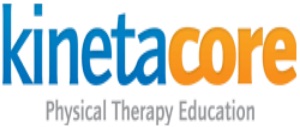We offer many physio solutions
- Manual Therapy
- IMS
- FMS
- FDN
- Joint Mobilizations
- Specialized Taping
- Gait Analysis
- Acupuncture
- Modalities
- Therapeutic Cupping
- SFMA
- Concussion Rehabilitation
- Exercise Perscription
- Soft Tissue Techniques
- Education

Manual Therapy
Manual Physiotherapy is a systematic, problem-solving approach to patient-centered assessment and treatment techniques used in the comprehensive management for spinal, upper extremity, lower extremity, temporomandibular joint and neuromusculoskeletal dysfunction.
Your physiotherapist will integrate a variety of manual techniques such as mobilizations, manipulations, neural flossing, soft tissue lengthening and joint specific stability exercise to maximize the return to normal joint mobility and function.

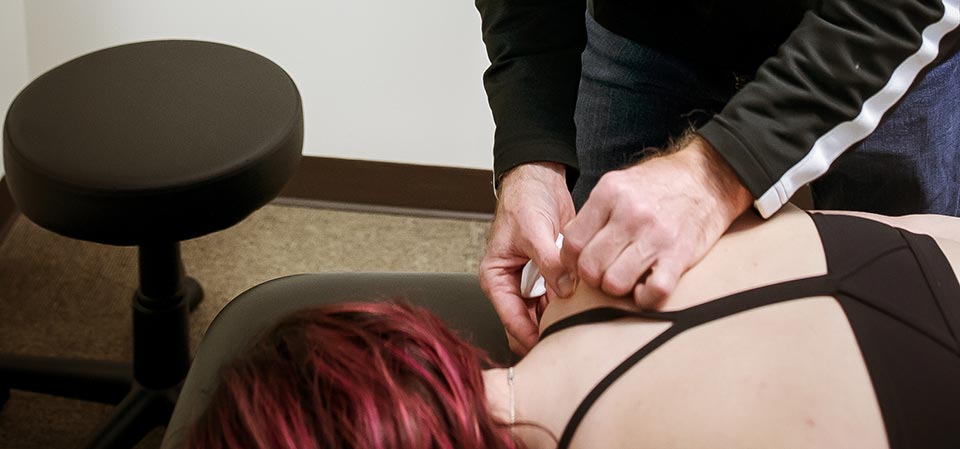
Gunn IMS
Intramuscular Stimulation (IMS) is a total system for the diagnosis and treatment of myofascial pain syndromes. IMS is grounded in Western Medical Science, and has a solid foundation in its radiculopathic model of pain. It was developed by Dr. Gunn while he was a physician at the Worker’s Compensation Board of British Columbia in the 1970’s. He was motivated to develop a treatment for chronic musculoskeletal pain that would not respond to traditional treatments. The treatment is designed to penetrate deep within muscle tissue, specifically targets injured muscles that have contracted and become shortened from distress.
IMS relies heavily on a thorough physical examination of the patient by a competent IMS practitioner, trained to recognize the physical signs of neuropathic pain.
The treatment involves dry needling of affected areas of the body without injecting any substance. The needle sites can be at the epicenter of taut, tender muscle bands, or they can be near the spine where the nerve root may have become irritated and supersensitive. Penetration of a normal muscle is painless; however, a shortened, supersensitive muscle will "grasp" the needle in what can be described as a cramping sensation. The result is threefold. One, a stretch receptor in the muscle is stimulated, producing a reflex relaxation (lengthening). Two, the needle also causes a small injury that draws blood to the area, initiating the natural healing process. Three, the treatment creates an electrical potential in the muscle to make the nerve function normally again.
The goal of treatment is to release muscle shortening, which presses on and irritates the nerve. Supersensitive areas can be desensitized, and the persistent pull of shortened muscles can be released.

Functional Movement Screen (FMS)
The functional movement screen (FMS) is an innovative assessment system used to evaluate movement patterns for active individuals. FMS is based on sound science, years of innovation, and current research.
FMS is comprised of seven fundaments movement patterns that ranks, grades and documents movement patterns. By screening these movement patterns, the FMS readily identifies functional limitations and asymmetries.
The FMS generates the Functional Movement Screen Score, which is used to target problems and track progress. This scoring system is directly linked to the most beneficial corrective exercises to restore mechanically sound movement patterns.
Functional Dry Needling (FDN)
Mabel is certified in functional dry needling with KinetaCore®.
What is dry needling?
Dry Needling is a general term for a therapeutic treatment procedure that involves multiple advances of a filament needle into the muscle in the area of the body which produces pain and typically contains a ‘Trigger Point’. There is no injectable solution and typically the needle which is used is very thin. Most patients will not even feel the needle penetrate the skin, but once it has and is advanced into the muscle, the feeling of discomfort can vary drastically from patient to patient.

Benefits
Dry needling is an effective treatment for acute and chronic pain, rehabilitation from injury, and even pain and injury prevention, with very few side effects.
How does it work?
Usually a healthy muscle feels very little discomfort with insertion of the needle; however, if the muscle is sensitive and shortened or has active trigger points within it, the subject may feel a sensation much like a muscle cramp — which is often referred to as a ‘twitch response’. The twitch response also has a biochemical characteristic to it which likely affects the reaction of the muscle, symptoms, and response of the tissue. Along with the health of the tissue, the expertise of the practitioner can also attribute to the variation of outcome and/or discomfort. The patient may only feel the cramping sensation locally or they may feel a referral of pain or similar symptoms for which they are seeking treatment. A reproduction of their pain can be a helpful diagnostic indicator of the cause of the patient’s symptoms. Patients soon learn to recognize and even welcome this sensation as it results in deactivating the trigger point, thereby reducing pain and restoring normal length and function of the involved muscle.
When can I expect benefits?
Typically, positive results are apparent within 2-4 treatment sessions but can vary depending on the cause and duration of the symptoms, overall health of the patient, and experience level of the practitioner.
For more information, you can go to: http://www.kinetacore.com/faq/#whatis

Joint Mobilizations and Manipulations
All physiotherapists use specifically tailored exercise to treat pain and stiffness. In addition to exercise, Manipulative Physiotherapists are highly trained at using their hands to diagnose and treat restrictions in movement in the spine, arms and legs. Using gentle, hands-on techniques, we can help reduce muscle tightness, improve movement in the joints, reduce pain and improve function.
In addition to our entry-level university education, CAMPT Physiotherapists have completed extensive, internationally recognized post-graduate education focusing on the diagnosis and treatment of complicated muscle and joint problems.
This education consists of several years of ongoing courses and standardized examinations, or a return to university to complete a Masters degree in Manipulative Physiotherapy. CAMPT Physiotherapists are extremely effective in treating muscle, joint and nerve conditions from head to toe. These include headaches, neck and shoulder pain, low back pain, sacroiliac joint and pelvic dysfunction, hip and knee arthritis, foot and ankle pain among many other conditions. Your physiotherapy assessment may include measures of body functions, strength testing, analysis of your walking patterns, posture, balance, joint movement, and function.
By combining the principles of evidence-informed practice, evaluative skills, clinical and professional judgment, your physiotherapist will work closely with you, and often with other health care professionals, to ensure that your health goals are met.

Specialized Taping & Return to Sport Programs
We are happy to offer a detailed assessment We are pleased to offer a variety of taping techniques that are designed to improve joint stability and proprioception as well as decrease pain and swelling and promote improved muscle imbalance and postural dysfunctions. Tapes used include Kinesiotape, Leukotape and Sports Tape.
We are also pleased to offer taping clinics designed for specific conditions that can be applied by coaches, parents or partners.

Biomechanical and Gait Analysis
We are happy to offer a detailed assessment centered on an individual’s specific gait (walking) patterns. The results of this assessment will be used to develop specific strengthening and/or stretching programs aimed at maximizing performance and minimizing strain and stress to the body.
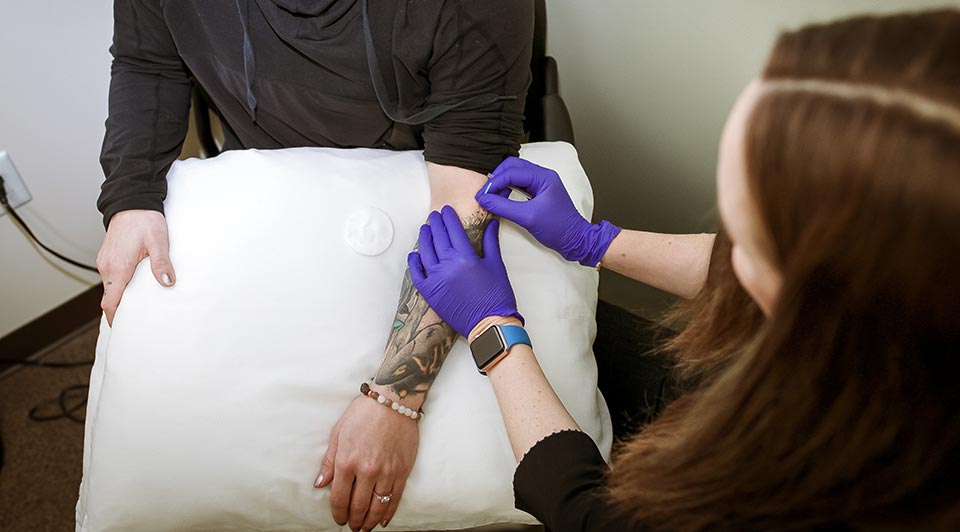
Acupuncture
Mabel is certified in acupuncture with Acupuncture Canada®.
“Acupuncture is an ancient, safe and effective alternative to medication and, in some cases, surgery. It stimulates the release of endorphins- the body’s natural pain-relieving neurohormones- through the insertion of needles into specific anatomical points (acupuncture points) to encourage natural healing. Therapeutic effects include:
- Pain relief
- Increased energy
- Improved mood
- Improved body function
Atraumatic acupuncture needles are rounded at the tip so that they slide smoothly through tissue and are unlikely to cause bleeding. Needles are left in place for 15-30 minutes during which time the practitioner may manipulation the needles in order to strengthen or reduce the flow of Qi.” (Acupuncture Canada, 2017)
For more information, you can go to: https://www.acupuncturecanada.org/acupuncture-101/what-is-acupuncture/
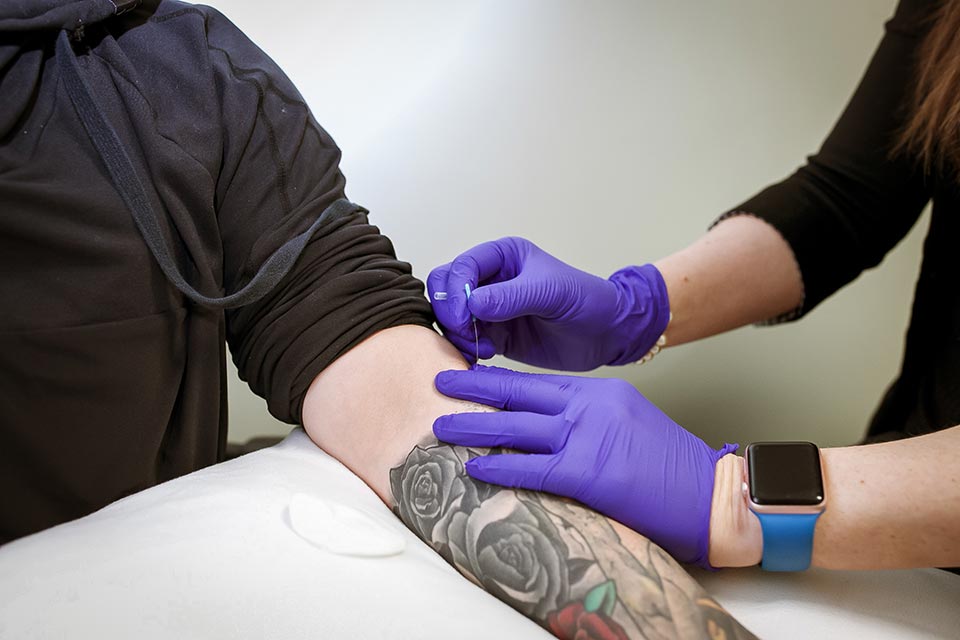

Modalities
We offer a variety of modalities, including:
Ultrasound
- Facilitates healing of tendons, ligaments and muscles
IFC (Interferential current) and TENS (transcutaneous electrical nerve stimulation)
- Pain relief
- Increases motion and function
- Increases healing and circulation
- Improves sleep
NMES- Neuromuscular Electrical Stimulation
- Muscle facilitation/isolation
- Prevent muscle atrophy
- Improve range of motion
- Decrease muscle spasticity
HVPC- High voltage pulsed current
- Decreases acute and chronic swelling and edema

Therapeutic Cupping
Cupping has many benefits including promoting blood flow and circulation, loosening up fascia and muscle knots, and releasing and draining excess fluids and toxins.
Selective Functional Movement Assessment (SFMA)
The Selective Functional Movement Assessment (SFMA) is a continuing education course designed for healthcare professionals that routinely treats patients with musculoskeletal conditions across their lifespan.
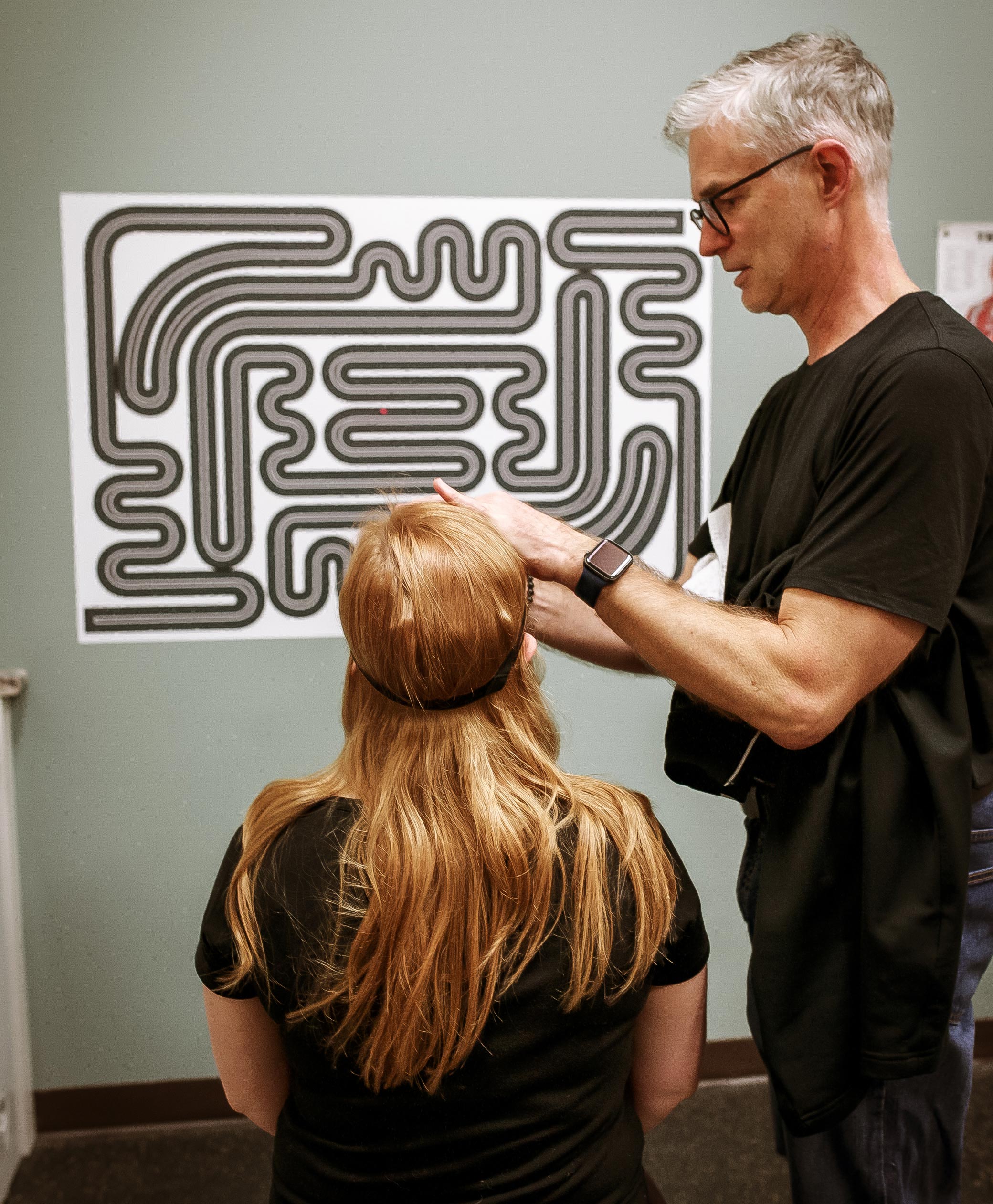
Concussion Rehabilitation
Our therapists have taken advanced courses to learn the latest and the greatest in concussion research and rehabilitation. We are equipped to both screen for a concussion, and treat concussions.

Exercise Perscription
Based on your individual needs, our physiotherapists will provide expert exercise programs to best rehabilitate, prevent and/or relieve physical dysfunction, injury or pain.

Soft Tissue Techniques
For information about Soft Tissue Techniques, check out: www.softtissuerelease.ca/what_is_str.html

Education
The Physiotherapists at Manual Physio Solution are committed to patient education. Your Physiotherapist will take time to explain the source of your pain and the steps that are necessary to help you to resolve your pain. Manual Physio Solutions also has a strong association with Nipissing University and Canadore College. Martin is an Adjunct Professor at Nipissing University in the Bachelors’ of Physical and Health Education. He is also an instructor in the Orthopaedic Division of the Canadian Physiotherapy Association. Mabel is an Adjunct Professor in the Physiotherapy Assistant program at Canadore College. Manual Physio Solutions is committed to advancing manual physiotherapy knowledge in Northeastern Ontario.
P. 705-478-6050
F. 705-478-7350
E. [email protected]
manualphysiosolutions.ca © 2025 Manual Physio Solutions
501 McKeown Ave Unit 2
North Bay
ON
P1B 9E4
CA
